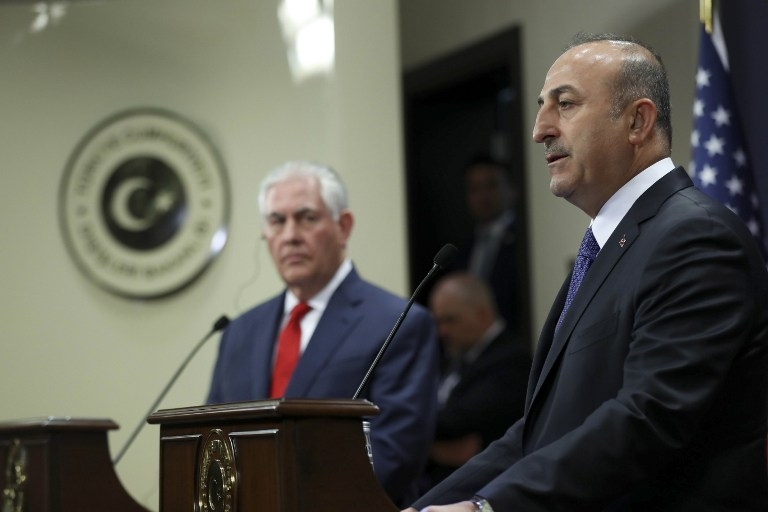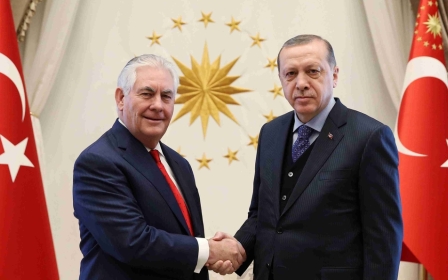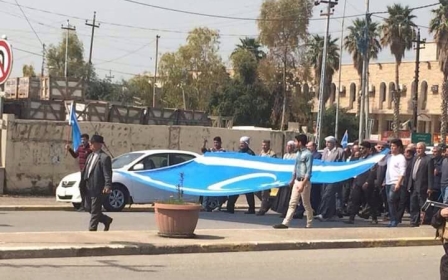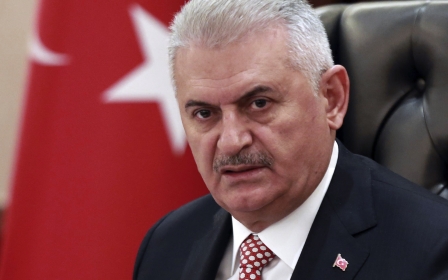'Syrian people will choose Assad's fate,' says Tillerson in Turkey

US Secretary of State Rex Tillerson met with Turkey's President Tayyip Erdogan and Prime Minister Binali Yildirim on Thursday in a visit seen as a major test of his diplomatic skills.
He said that the future of Syrian leader Bashar al-Assad will be decided by the Syrian people and that there had also been discussions on creating stabilisation zones in Syria.
“There's no space between Turkey and the US and our commitment to defeat Daesh, to defeat ISIS," Tillerson added.
He emphasised Turkey's "important role" in regional security and said Ankara is a key actor for stabilisation efforts in the fight against the Islamic State. Tillerson also said Ankara and Washington have the common goal of reducing Iran's potential to disrupt the region.
Ankara anger at Washington
Turkey has been angered by US support for Kurdish YPG militia fighters, which Turkey considers an extension of the PKK, a terrorist group according to both Turkey and the United States.
"We have to reinforce the relationship between Turkey and the United States," said the Turkish Foreign Minister Mevlut Cavusoglu at a joint press conference.
"The previous US administration's collaboration with a terrorist organisation such as the YPG has strained our relationship," he added.
Cavusoglu said the US and Turkey should be able to confront Islamic State by themselves. "If we have to rely on other terrorist organisations for that, then we have a serious problem," he said.
'The previous US administration's collaboration with a terrorist organisation such as the YPG has strained our relationship'
- Turkish Foreign Minister Mevlut Cavusoglu
And the minister also denounced what he called "a dubious US policy" of obstructing the extradition of Fethullah Gulen, accused by Turkey of orchestrating the failed coup attempt in July last year. He said he hopes the new administration will take immediate steps such as the temporary detention of Gulen.
Cavusoglu also described as "political" the arrest in New York of a senior executive from Turkey's state-run Halkbank, charged with participating in a multi-year scheme to violate sanctions against Iran.
The banker is accused of conspiring with Turkish-Iranian gold trader Reza Zarrab, who is already on trial in the United States.
Cavusoglu told the press that the US attorney who launched the case against Zarrab had close ties with Gulen supporters.
US is not focused 'on getting Assad out': Nikki Haley
Echoing Tillerson's statements, US ambassador to the UN Nikki Haley said US' diplomatic policy on Syria for now is no longer focused on making Assad leave power.
The view of the Trump administration is also at odds with European powers, who insist Assad must step down.
"You pick and choose your battles and when we're looking at this, it's about changing up priorities and our priority is no longer to sit there and focus on getting Assad out," Haley told a small group of reporters.
"Do we think he's a hindrance? Yes. Are we going to sit there and focus on getting him out? No," she said. "What we are going to focus on is putting the pressure in there so that we can start to make a change in Syria."
"We can't necessarily focus on Assad the way that the previous administration did," said Haley, a former governor of South Carolina. "Our priority is to really look at how do we get things done, who do we need to work with to really make a difference for the people in Syria."
A senior Trump administration official told Reuters Haley's remarks reflected "a measure of just realism, accepting the facts on the ground. ... Assad is never going to have sufficient force to reassert control over the whole country ... Our focus is on defeating ISIS and al Qaeda and preventing Syria from being used as a terrorist safe haven.”
Middle East Eye propose une couverture et une analyse indépendantes et incomparables du Moyen-Orient, de l’Afrique du Nord et d’autres régions du monde. Pour en savoir plus sur la reprise de ce contenu et les frais qui s’appliquent, veuillez remplir ce formulaire [en anglais]. Pour en savoir plus sur MEE, cliquez ici [en anglais].




